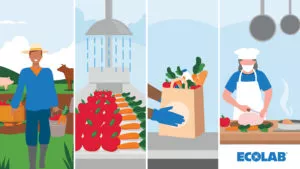/SPONSORED CONTENT/
It can seem challenging to find positive takeaways from the COVID-19 pandemic, but there’s one silver lining for the food industry that’s worth noting: a drop in foodborne illness.
In the last year, studies have shown our global measures to protect against coronavirus —wearing face coverings, physical distancing, enhancing hygiene and disinfection practices — may have also contributed to a decline in foodborne diseases. One study conducted in the U.S. last year found an 86% reduction in norovirus infections, a leading cause of foodborne illness.
That’s a remarkable decline and a strong reminder that foodborne illnesses are preventable and good hygiene habits are part of the solution. In recognition of June’s World Food Safety Day, Ecolab experts discussed how we can continue to minimize food safety risks while addressing challenges as businesses return to full operations.
Amanda Bakken, Lead Chemist
The pandemic created a cultural shift around cleanliness, hygiene and food safety. The best way to make sure it sticks is to set clear expectations for ongoing visible cleaning internally with staff, as well as with customers. When customers see how seriously a business is taking precautions, they’ll feel safe and comfortable.
It’s also important that we change the narrative around cleaning protocols and show that they weren’t just about COVID-19, but that we’re continuing them to prevent foodborne illness and other diseases. We saw positive effects from the heightened level of cleanliness, and we want these to continue well into the future.
Dr. Elaine Black, Director, Food Safety and Public Health
We have to acknowledge that the drop in foodborne illness was largely because we all became better and more aware of our own hygiene practices. We were washing our hands and enhancing cleaning and public health protocols. It was a mindset where we understood why we were making these efforts and we became used to them.
The food industry has to leverage this momentum by implementing thoughtful sick leave policies, enhancing cleaning and disinfection programs and maintaining strong hand hygiene practices. Businesses should take credit for this and build it into their policies permanently, and make customers aware that it’s happening.
Rick Stokes, Food &Beverage Technical Support Manager
At first, a lot of people were unsure of the appropriate cleaning and hygiene solutions to combat coronavirus and were often over-sanitizing without understanding the science behind it. Ecolab helped them cut through the confusion and simplify with effective solutions and procedures.
We also helped customers do more with less, optimizing efficiency at a time of labor challenges. Digital technologies have played a big part, and customers can now receive actionable data out of digital monitoring to help prevent problems and streamline operations.
Lisa Robinson, Vice President, Global Food Safety and Public Health
In the last year, food safety professionals had to shift and become public health professionals. They may have known how to navigate an E. coli outbreak, but had pivot to understand a new respiratory virus and how it would impact their business. They’re now working to use that shift to decide what hygiene mitigations to continue moving forward.
Another big challenge businesses now face is a shortage of labor to serve returning customers. A key way to help maintain food safety during this transition is with comprehensive programs and effective employee training. For example, the Ecolab Science Certified™ program provides the right products, training and support to ensure businesses provide the consistent, heightened level of clean that customers have come to expect.
For more information, visit .ecolab.com
